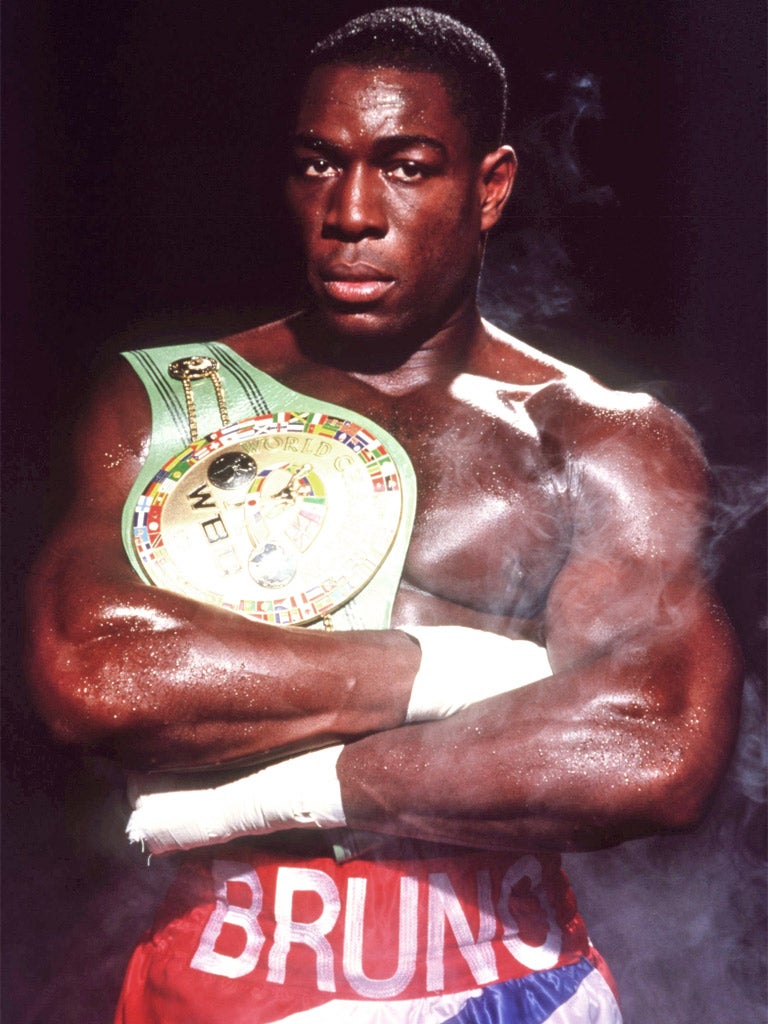Bunce on boxing: Why Frank Bruno and other champs owe ring’s Huggy Bear, Johnny Bos
“I need them to have a pulse, not much of a pulse” Bos said of his men

Your support helps us to tell the story
From reproductive rights to climate change to Big Tech, The Independent is on the ground when the story is developing. Whether it's investigating the financials of Elon Musk's pro-Trump PAC or producing our latest documentary, 'The A Word', which shines a light on the American women fighting for reproductive rights, we know how important it is to parse out the facts from the messaging.
At such a critical moment in US history, we need reporters on the ground. Your donation allows us to keep sending journalists to speak to both sides of the story.
The Independent is trusted by Americans across the entire political spectrum. And unlike many other quality news outlets, we choose not to lock Americans out of our reporting and analysis with paywalls. We believe quality journalism should be available to everyone, paid for by those who can afford it.
Your support makes all the difference.Johnny Bos was the undisputed boxing “King of New York” with a unique role in the careers of hundreds of fighters during decades of devotion to the ignoble art.
He finally died last Saturday after years as an outcast in Florida, which he called “solitary confinement”, from heart disease. He was 61 and was still spitting out riddles of boxing truth, lies, conspiracy theories and, most importantly, brilliant analysis.
Bos was a fixer in the brutal game, a man who made fights happen for decades by finding the right opponents for the right fighters. He was the matchmaker to dozens of protected boxers, playing the most crucial role in their development and making sure that nobody ruined the script. It was all legal and that is why Bos was a giant.
He stood 6ft 4in in either his boots or his pimp pumps and at his peak of influence he topped the scales at about 19st. His hair was blond at one point but was gloriously dyed gold for the last decade or more; his wrists jangled with watches, his neck held in place ropes of gold and silver with boxing gloves of all sizes attached. If times were high, and he was making the fights for a big boxer, the gold gloves glistened with diamonds. To complete the look, which was clearly an influence on Huggy Bear and all the other stereotypical street guys in New York’s films and fictions, Bos fell in love with a white fur coat and wore it all the time. Johnny was not a shy guy.
He made the matches that built the career of Gerry Cooney, arguably one of the best heavyweights not to win a world title in recent years, and his acquisition of the right man, on the night, helped Cooney develop perfectly. It is claimed that on one particular cold evening an opponent Bos hired for a Cooney fight was unable to get to the venue, and that Bos stripped down and fought the man that he was making. “That’s dedication,” said Mike Marley, a veteran boxing writer at the New York Post.
“I need them to have a pulse, not much of a pulse,” Bos once famously said of the men he found. The declaration was comforting enough for Mickey Duff to turn to Bos when Frank Bruno needed building. It was Bos who found the bodies that allowed Bruno to learn his trade, develop survival instincts and eventually, after a few hiccups, win the world title. Make no mistake that without the Bos touch at the start of his career there would not have been the glory at the end for Bruno. Duff, who is arguably the greatest brain in British boxing, insisted that when Bos was sober he was the best analyst in the fight game and that is praise.
There was, obviously, more to Bos than a fur coat and quote; since Saturday the dwindling members of the old-school fight fraternity have been talking with the type of reverence that seldom accompanies a modern boxing death. Bos was a throwback in so many ways, a man who would join you at a New York gym to tip you off about a kid who was just about to spar. He knew and understood the way boxers and boxing people worked, and that often meant that he had battles to fight outside the ring. He fell out of favour in New York during the last decade and that led to exile, but it was not the end of his influence.
Bos was a legend in a business and a fight city that once ruled the boxing waves. He did belong in the rich fiction of Damon Runyon had the Broadway stories been set in the Seventies and Eighties and Nineties. Bos leaves a polished boxing business, one where the beautiful fixers and dwellers from the lost gyms of history are becoming rare.
Join our commenting forum
Join thought-provoking conversations, follow other Independent readers and see their replies
Comments